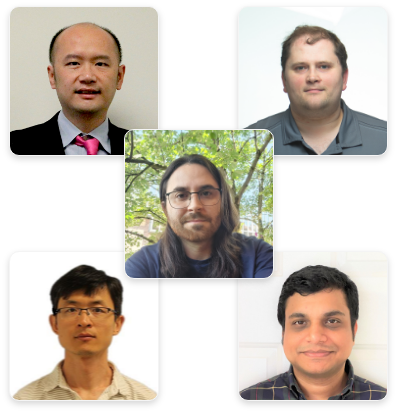oneAPI DevSummit for AI and HPC 2022


The oneAPI DevSummit for AI and HPC is a free virtual community conference for those who are interested in performant, cross-architecture programming and want to evolve heterogeneous computing to its fullest potential.
Industry experts take a deep dive into cross-architecture software development, spanning:
– AI and analytics using industry-standard frameworks and tools, performance-optimized by oneAPI
– What’s new with oneAPI including Intel® AI Analytics and HPC Toolkits
– Overviews of key performance analysis tools
– The latest on the oneAPI specification
– Hands-on workshops with TensorFlow and PyTorch
You’ll get to experience a luminary keynote, tech talks, hands-on tutorials, and a perspective on AI and HPC to catapult you to the next level in your developer journey. This event promises to deliver a top-notch view of the aspects of AI and HPC vital to your development career.


Sriram Ramkrishna is the community manager of oneAPI with over 20 years working in technical and open source communities ranging from application and user space communities to communities who work in kernel and near metal space. Today, Sri is focused on expanding and evolving the oneAPI community into a vibrant and active community that provides value and scope for innovation in the various fields that involve AI, HPC and beyond.

Susan Kahler is a Product Marketing Manager for AI at Intel. She has her Ph.D. in Human Factors and Ergonomics, having used analytics to quantify and compare mental models of how humans learn complex operations. Throughout her well-rounded career, she has held roles in user centered design, product management, customer insights, consulting and operational risk. Susan recently completed her Master of Science in Analytics, focusing on healthcare analytics. She also holds a patent for a software navigation system to guide users through dynamically changing systems.


Andres Rodriguez is an Intel Fellow and Chief AI Architect. He designs deep learning solutions for Intel’s datacenter customers and provides technical leadership across Intel for deep learning hardware and software products. He was the lead instructor in the Coursera course An Introduction to Practical Deep Learning to over 20K students and is the author of the popular Deep Learning Systems book. He has been an invited speaker at several AI events and university lecturer.


Peter Ma is Co-Founder at SiteMana, an AI company that predicts anonymous visitor purchasing intent. He’s also part of Intel Software Innovator, TED speaker and Techstars Alumni.


Zhen Dong received B.S. from Peking University in 2018 and Ph.D. from University of California at Berkeley in 2022. He is currently a postdoc at UC Berkeley working with Prof. Kurt Keutzer. Zhen received the Outstanding Graduate Award at Peking University and the distinguished Berkeley University Fellowship.
His research interests include efficient deep learning, quantization, model compression, and hardware-software co-design.

Kurt Keutzer is a Professor of EECS at University of California, Berkeley where he is a member of the BAIR Lab and co-director of the Berkeley Deep Drive research consortium. His research covers all aspects of Deep Learning. His collaboration on the LARS and LAMB algorithms reduced the training time of ImageNet and BERT to minutes. His “Squeeze” family of DNNs were among the first DNNs suitable for mobile applications. Previously, Kurt was CTO at Synopsys, and his contributions to Electronic Design Automation were recognized at the 50th Design Automation Conference where he was noted as a Top 10 most-cited author, author of a Top 10 cited paper, and one of only three people to win four Best Paper Awards in the 50-year history of that conference. As an entrepreneur Kurt has been an investor and advisor to over 30 startups. His most recent exits have been DeepScale (co-founder), acquired by Tesla, and BabbleLabs (investor and advisor), acquired by Cisco.


Pramod Pai is an AI Software Solutions Engineer at Intel who enables customers to optimize their Machine Learning workflows using solutions from Intel®. His areas of focus include Intel® oneAPI AI Analytics Toolkit, and Intel® Extension for PyTorch*. He holds a Master’s degree in Information Systems from Northeastern University.

AI Frameworks Engineer working on enabling Intel optimizations for PyTorch.


Sai Rama Raju Penmatsa is currently pursuing his Masters in Software Engineering with Data Science as a specialization at SJSU and Working as a Graduate Research Assistant in Computer Vision.

Immediately after Ankur Singh’s undergrad, he started his own company in India, called “Ai Adventures”, which provided AI/ML solutions to businesses. After 3 years, he joined Zoop.one as the ML team lead. Currently, he is pursuing his Masters in Software Engineering at SJSU. He is super excited to be here.


Abhishek Nandy is co-founder of Dynopii. He has a B.Tech degree and a curious mind. He is also an Intel Black Belt Developer – a coveted open-source Intel award given to people who have contributed to Intel Open Source Contribution. He has presented his research work on Reinforcement Learning at ACM SIGGRAPH 2018. He has been an invited educator at several leading premier education institutes in India. Abhishek has also authored books on Reinforcement learning, Unity ML, Leap Motion and Game engines. He was also among the top 50 innovators at the first edition of the Make in India initiative. There he received training for his product lifecycle to practice from IIMA and MHRD IT Dept of Government of India.


Rod has been helping developers to build complex software for well over a decade. Working at Codeplay Software Rod is involved in providing supporting and building educational materials for developers using our SYCL product. Most recently Rod helped to create “SYCL Academy,” a set of materials for teaching SYCL, that have already been adopted by some of the top universities in the world. Rod has been involved in writing a range of training courses.


Stephano Cetola is the Director of Technical Programs for RISC-V International. He has developed and managed numerous open source initiatives in software and hardware over the course of his 20 year career in technology. Stephano helped to form the Confidential Computing Consortium, a Linux Foundation project bringing together hardware vendors, cloud providers, and software developers to accelerate the adoption of Trusted Execution Environment (TEE) technologies and standards. Before joining RISC-V International, Stephano was employed at Intel contributing to Yocto Project embedded Linux systems and working on TianoCore open source firmware. He holds an M.S. ECE from Portland State University where he continues to be involved in research surrounding hardware security and threat modeling.


Sachin Muradi has been at Intel for 5 years and is part of the team that deals with the Tensorflow-oneDNN Direct Optimization which helps integrate Intel oneDNN optimizations for CPUs in Google’s open source ML framework Tensorflow. He has experience working on various libraries/compilers for deep learning accelerator hardware within Intel, such as nGraph backend for Deep learning inference Accelerator (SpringHill), Movidius/ VPU compiler – openVINO plugin, FPGA (DLIA)


Susan Kahler is a Product Marketing Manager for AI at Intel. She has her Ph.D. in Human Factors and Ergonomics, having used analytics to quantify and compare mental models of how humans learn complex operations. Throughout her well-rounded career, she has held roles in user centered design, product management, customer insights, consulting and operational risk. Susan recently completed her Master of Science in Analytics, focusing on healthcare analytics. She also holds a patent for a software navigation system to guide users through dynamically changing systems.


Russ Beutler is an Engagement Manager for oneAPI in the Developer Ecosystem Programs Team in the Intel Architecture Graphics and Software group. Previously he was the marketing manager for Intel® persistent memory and moderncode developer programs. He has over twenty-five years’ worldwide hardware and software marketing, consulting, and IT experience – twenty-one of which are at Intel.


Sriram Ramkrishna is the community manager of oneAPI with over 20 years working in technical and open source communities ranging from application and user space communities to communities who work in kernel and near metal space. Today, Sri is focused on expanding and evolving the oneAPI community into a vibrant and active community that provides value and scope for innovation in the various fields that involve AI, HPC and beyond.

Susan Kahler is a Product Marketing Manager for AI at Intel. She has her Ph.D. in Human Factors and Ergonomics, having used analytics to quantify and compare mental models of how humans learn complex operations. Throughout her well-rounded career, she has held roles in user centered design, product management, customer insights, consulting and operational risk. Susan recently completed her Master of Science in Analytics, focusing on healthcare analytics. She also holds a patent for a software navigation system to guide users through dynamically changing systems.


CEO and co-founder of Codeplay, a pioneer in GPU acceleration, Andrew started his career writing video games in the days of 8-bit computers, progressing to write best-selling titles such as Pete Sampras Tennis. Andrew researched and developed early GPU compiler technology, and founded Codeplay in 2002. Codeplay have been producing compilers for games consoles, special-purpose processors and GPUs since then. Andrew chaired the SYCL standards group for its early years, which is now gaining rapid adoption, including now the C++ programming model for Intel’s oneAPI. Today, Codeplay is a world-leading specialist in heterogeneous computing technology, now working on extreme challenges from exascale to artificial intelligence and safety for self-driving cars. In July 2022, Codeplay became a subsidiary of Intel.


JaeHyuk Kwack is a member of the Performance Engineering Team at the ALCF. He is responsible for performance tools and ensuring the readiness of a number of major scientific applications for performant use on the U.S. DOE forthcoming exascale systems.


Luke Kljucaric is the lead computer engineering PhD student of the HPC/Reconfigurable systems group in NSF SHREC at the University of Pittsburgh. His research focuses on accelerated machine learning, which includes traditional and neuromorphic classification studied on CPUs, GPUs, and FPGAs.


David Hardy is a senior research programmer at the University of Illinois at Urbana-Champaign. He leads the development of NAMD and was part of the research effort awarded in 2020 the ACM Gordon Bell Special Prize for High Performance Computing-Based COVID-19 Research.


Marcel Breyer is a PhD student at the University of Stuttgart, Germany. His main field of research is on performance portability on heterogeneous hardware, which includes a GPU accelerated Parallel Least Squares Support Vector Machine (PLSSVM) using SYCL.


Rafael Lago has his Computer Science PhD with a strong academic background. He has worked in research institutes in Brazil, Canada, France and Germany and is specialized in numerical linear algebra and MPI. He has applied his expertise on seismology, geophysics, plasma physics and applied mathematics applications. In January 2022, Rafael joined Intel as a TCE in EMEA’s Team.

Rupak Roy is a Software Technical Consulting Engineer at Intel. He has expertise in Intel oneAPI Analyzer tools, Intel Compilers, Heterogeneous Programming, and High Performance Computing. He also has experience of working with oneVPL (oneAPI Video Processing Library).

Shiquan Su is a Software Technical Consulting Engineer at Developer Tools Customer Engineering department. He holds his degree in theoretical physics. My past career is most about high performance computing. Currently, he supports the Fortran compiler, OpenMP and other products in the oneAPI programming model.

James Tullos is a Senior Technical Consulting Engineer with Intel® Software Development Products. He enables developers to utilize tools for high performance computing and parallel programming.

Yantao Zhang is a Software Technical Consulting Engineer with Intel. He is currently working on supporting DPC++ compiler and compatibility tool. His current interests include GPU programming, GPU architecture and Computational Science. He has a PhD from structural engineering University of California San Diego in the area of computational mechanics.


Sriram Ramkrishna is the community manager of oneAPI with over 20 years working in technical and open source communities ranging from application and user space communities to communities who work in kernel and near metal space. Today, Sri is focused on expanding and evolving the oneAPI community into a vibrant and active community that provides value and scope for innovation in the various fields that involve AI, HPC and beyond.


Russ Beutler is an Engagement Manager for oneAPI in the Developer Ecosystem Programs Team in the Intel Architecture Graphics and Software group. Previously he was the marketing manager for Intel® persistent memory and moderncode developer programs. He has over twenty-five years’ worldwide hardware and software marketing, consulting, and IT experience – twenty-one of which are at Intel.